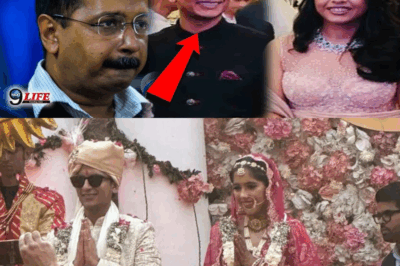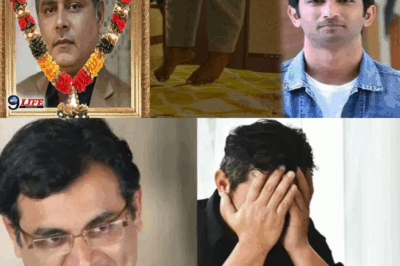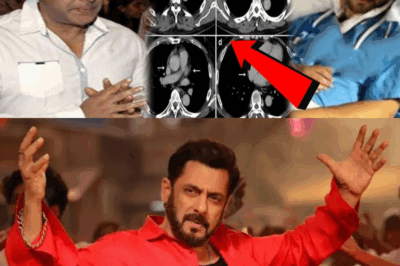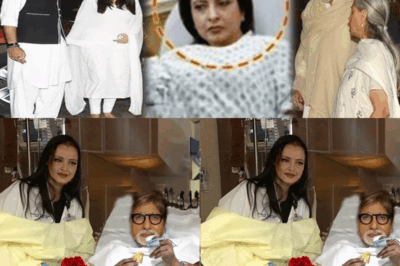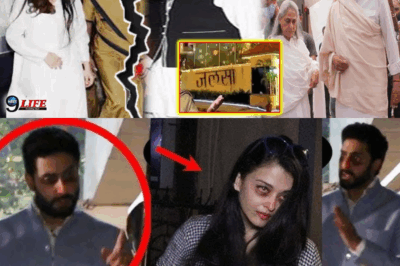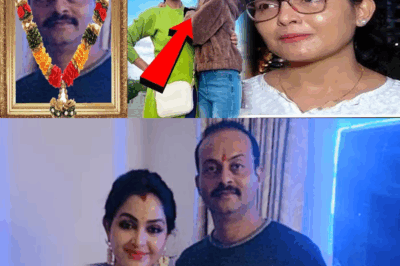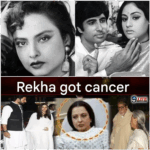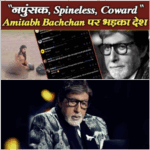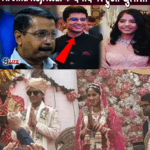Just In: Renowned Personality from the Film Industry Passes Away, Had a Connection with Actress Rani Mukerji
In a deeply saddening turn of events, the Indian film industry has lost one of its most respected and beloved figures. Veteran filmmaker and screenwriter Ram Mukherjee, a stalwart of Hindi cinema and father of actress Rani Mukerji, has passed away, leaving behind a legacy of artistic brilliance and generational impact.
The news broke early this morning, and within hours, tributes began pouring in from across the industry—actors, directors, producers, and fans alike. His passing marks not only the loss of a cinematic mind but also the end of an era, particularly for those who witnessed the golden age of Indian cinema during the 1960s through the 1980s.
A Life Dedicated to Cinema
Born in 1933, Ram Mukherjee was a key figure in the Indian film industry, particularly known for his contributions to Hindi and Bengali cinema. He hailed from the Mukherjee-Samarth film family, one of the most influential film dynasties in India.
Ram Mukherjee began his career as a scriptwriter and quickly rose through the ranks to become a successful director and producer. He co-founded Filmalaya Studios, which was instrumental in launching the careers of many stars, including Shammi Kapoor and Sadhana. His directorial style was known for its blend of emotional depth, family values, and commercial appeal—captivating audiences for decades.
Some of his most memorable works include Hum Hindustani (1960), Leader (1964), and Rakhi Aur Hathkadi (1972). These films not only performed well at the box office but also left a lasting cultural imprint.
“He was not just a filmmaker; he was a storyteller who understood human emotion,” said veteran actor Dharmendra, who worked with Mukherjee during the early years of his career.
The Mukherjee Legacy: Connecting Generations
Ram Mukherjee’s most significant legacy may well be his role in nurturing the next generation of artists. His daughter, Rani Mukerji, is one of Bollywood’s most acclaimed actresses, known for her versatility and powerhouse performances in films like Black, Mardaani, Hum Tum, and No One Killed Jessica.
It was Ram who gave Rani her first break in cinema with the Bengali film Biyer Phool (1996), followed by her Hindi debut Raja Ki Aayegi Baraat the same year. Though her entry was modest, her growth into one of the industry’s finest talents reflects the artistic foundation laid by her father.
Rani has often spoken about her father’s influence on her craft.
“My father taught me to respect every frame of cinema. He never imposed the industry on me—he inspired me into it,” she said in a past interview.
A Private Goodbye: Final Moments and Family Statement
Ram Mukherjee had been ailing for some time due to age-related health issues. According to sources close to the family, he passed away peacefully in the early hours at his residence in Mumbai, surrounded by family.
Rani Mukerji, who was by his side, has not made a public statement as of yet but is said to be devastated by the loss. The family has requested privacy during this deeply personal time.
In a brief note issued by the family’s representative, it was stated:
“It is with profound grief that we announce the passing of Shri Ram Mukherjee. A visionary, a father, and a true lover of cinema. He lived a full life dedicated to art and family. We kindly request the media to respect our privacy during this period of mourning.”
The last rites were performed at Vile Parle Hindu Crematorium this afternoon in the presence of close family members and a few colleagues from the film industry.
Industry Mourns a Giant
Tributes have come in from across the spectrum of Indian cinema. From legendary directors to emerging stars, everyone seems to have a memory or story about Ram Mukherjee.
Amitabh Bachchan, who worked in the film Leader, posted on social media:
“Ram Mukherjee ji was a pillar of our industry. His storytelling was gentle, yet powerful. His wisdom was quiet, yet commanding. Saddened by his departure. Strength to Rani and the family.”
Karan Johar, a close family friend, wrote:
“The Mukherjees are part of Bollywood’s very fabric. Ram uncle was grace and genius rolled into one. His passing is a personal loss to many of us.”
Vidya Balan, who has often worked with Rani and shares a mentor-like connection with the family, posted:
“He believed in the power of women-led stories way before it was fashionable. His voice, though soft-spoken, was ahead of its time.”
A Quiet Contributor to Women Empowerment in Cinema
Though not always vocal about feminism, Ram Mukherjee was known for supporting female leads in strong, independent roles. His stories often centered around women making difficult choices, standing up to societal norms, or finding their own identity in a patriarchal world.
In fact, one of his films, Rakhi Aur Hathkadi, revolved around a woman’s struggle between familial duty and personal freedom—a theme that remains relevant even today.
“He didn’t believe in preaching through cinema. He let the characters live and speak for themselves,” said veteran film historian Meena Iyer.
A Mentor to Many
Beyond his own family, Ram Mukherjee mentored many aspiring writers, editors, and technicians. He was known for encouraging young talent without any air of elitism.
One such student, now a well-known director, shared an emotional post:
“I remember him sitting in the editing room for hours, not saying a word. Then he’d offer one line of advice—and it would change the entire scene. That was his brilliance.”
He was also instrumental in supporting the careers of Deb Mukherjee, Joy Mukherjee, and Kajol in their early years, all of whom belong to the extended Mukherjee clan.
His Influence on Modern Filmmaking
While his directorial works may belong to an earlier generation, his aesthetic sensibility, narrative patience, and respect for family values remain deeply relevant.
Many modern directors cite his films as a reference for crafting family dramas or emotion-driven cinema without over-dramatization.
Shoojit Sircar, director of Piku and October, once said:
“Filmmakers like Ram Mukherjee taught us that emotion is best portrayed through silence, through gaze, not just dialogue. His use of music, pauses, and composition was poetic.”
His Relationship with Rani Mukerji: More Than Just a Father
The bond between Ram and Rani was one of mutual admiration. While he introduced her to the world of cinema, he never overshadowed her journey. Rani often referred to him as her “anchor” and “first audience.”
In an old interview, Rani had shared:
“After every film, I would sit next to him and wait for his reaction. He didn’t say much, but when he smiled and nodded—I knew I had done well.”
Bollywood’s Emotional Farewell
As news of his passing spreads, an emotional wave has gripped Bollywood. Film shoots were reportedly paused on multiple sets as a mark of respect. Several celebrities visited the family residence, maintaining COVID-19 precautions and offering silent condolences.
A public memorial service is being planned next week, where friends and industry colleagues will pay their respects and celebrate his life through film screenings, speeches, and tributes.
Legacy Beyond the Screen
Beyond cinema, Ram Mukherjee was a gentle human being with a deep love for literature, poetry, and painting. He often donated anonymously to charities, supported film schools, and was a quiet patron of the arts.
His impact may not have always made front-page headlines, but those who knew him closely describe a man of substance, depth, and grace.
Conclusion: A Timeless Filmmaker, A Loving Father, A Gentle Soul
In a world where noise often overshadows depth, Ram Mukherjee stood as a quiet force of excellence. His stories moved audiences. His values nurtured a family of legends. And his death has left a void that few can fill.
As the film fraternity mourns this profound loss, one thing is certain—Ram Mukherjee may have exited the world stage, but his cinematic spirit, values, and artistic influence will live on through his daughter, his films, and every heart he touched along the way.
May he rest in peace, and may his legacy continue to inspire generations of storytellers to come.
News
Just two days after the wedding, a revelation about Arvind Kejriwal’s son-in-law shocked his daughter Harshita.
A Shocking Revelation: The Story Behind Arvind Kejriwal’s Son-in-Law and the Impact on His Daughter Harshita Weddings are typically a…
Actor Lalit Manchanda hanged himself; his body was found in a locked room, similar to Sushant Singh.
Tragedy in Bollywood: The Untimely Death of Actor Lalit Manchanda The world of entertainment is often seen as one filled…
Salman Khan has been diagnosed with a life-threatening illness and, due to his suffering, attempted to take his own life. He is currently undergoing treatment in the United States.
Salman Khan Diagnosed with Life-Threatening Illness: Struggle, Despair, and Hope Amid Treatment in the United States Bollywood, with its dazzling…
Rekha has been diagnosed with cancer and has been admitted to the hospital, leaving Amitabh and Jaya shocked.
Rekha Diagnosed with Cancer: Hospitalization Leaves Amitabh and Jaya Shocked The world of Indian cinema is no stranger to dramatic…
Aishwarya Reached Jalsa House with the Police, Leaving Amitabh, Jaya, and Abhishek Shocked
Aishwarya Reached Jalsa House with the Police, Leaving Amitabh, Jaya, and Abhishek Shocked Mumbai, the city of dreams, is no…
A revelation has come out about actress Shubhangi Atre’s 18-year-old daughter; the family is devastated by the father’s death.
A Revelation Has Come Out About Actress Shubhangi Atre’s 18-Year-Old Daughter; The Family Is Devastated by the Father’s Death…
End of content
No more pages to load

